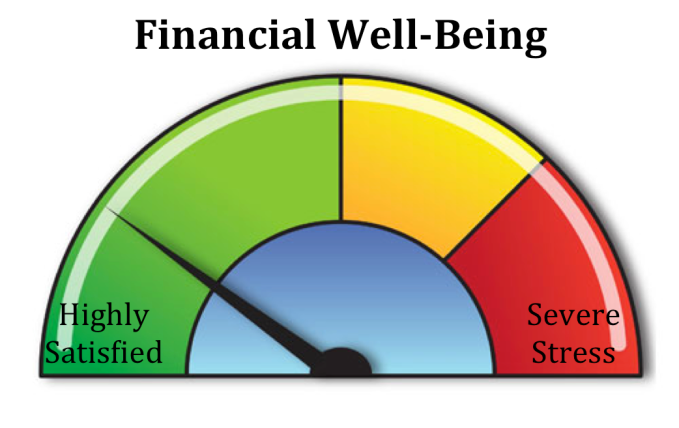In my last post I talked about the circumstances that have made you ultimately responsible for your financial well-being in retirement. It’s important to define what I mean when talking about financial well-being.
First and most important, financial well-being is not a number! “I’d be all set if I had a million dollars” is a great example of what financial well-being is not. Okay, you may be able to make it work on a million dollars, however the gap between what you have set aside for retirement today and a million dollars may seem unachievable, leading to despair. On the other hand, a million dollars equally divided over 20 years is $50,000 a year. You may think you need more than this to live on each year, or you may expect to live another 30 years or more, making the annual draw on your million dollars as little as $30,000 a year. The problem with this way of thinking is there is a lot of uncertainty surrounding retirement and no thought to the quality of retirement we’re looking to finance.
The truth is financial well-being is really a continuum that is not strictly aligned with the level of income you make.
 Some people seem to have and feel they have a high level of financial well-being, even though they are far from being what is generally thought of as affluent. On the other hand, some people with much higher incomes do not appear to have nor do they feel they have a high level of financial well-being at all. In other words, they are severely stressed about their finances even though they make a lot of money.
Some people seem to have and feel they have a high level of financial well-being, even though they are far from being what is generally thought of as affluent. On the other hand, some people with much higher incomes do not appear to have nor do they feel they have a high level of financial well-being at all. In other words, they are severely stressed about their finances even though they make a lot of money.
Your objective as you plan for retirement is to move from where you are on the continuum today toward a more highly satisfied place. What does that “highly satisfied” state of financial well-being look like? The Consumer Financial Protection Bureau (CFPB) conducted research on this and defines financial well-being as:
A state of being where you can meet your current and ongoing financial obligations, can feel secure in your financial future, and are able to make choices that allow you to enjoy life.
The four elements of financial well-being are:
- Having control over day-to-day and month-to-month finances – This means you manage your finances, your finances do not manage you. You pay your bills on time, you cover your necessary expenses and you don’t worry about having enough money to get by. (We’ll discuss needs versus wants later).
- Having the capacity to absorb a financial shock – Your car needs major repairs, the furnace needs to be replaced (or roof, or washing machine, or refrigerator…you get the idea) or you temporarily lose your job. Do you have the resources to cover these expenses? The resources here can be family members, insurance, extended warranties, along with personal savings.
- Being on track to meet your financial goals – This means having a formal or informal financial plan with goals you are working toward such as saving for a car or home, paying off loans or saving for retirement.
- Having the freedom to make choices that allow you to enjoy life – This means you are meeting your “needs” and splurging once in awhile on “wants” such as dinner and a movie, a week of vacation away from home, or to invest in your hobby. Making choices can also mean donating time, goods or money to your favorite charity. This last element is very personal and speaks to the quality of life.
Please leave a comment below and tell me what does “the freedom to make choices that allow you to enjoy life” means to you.
